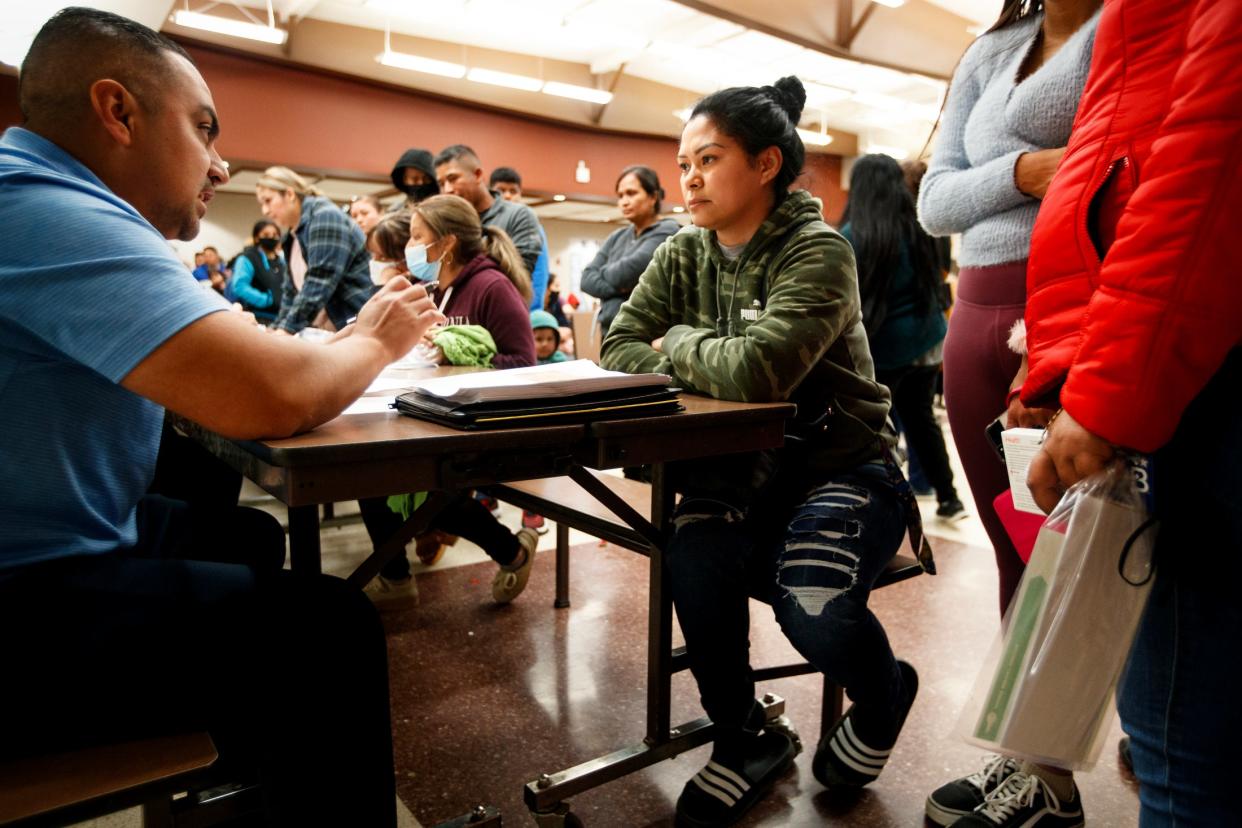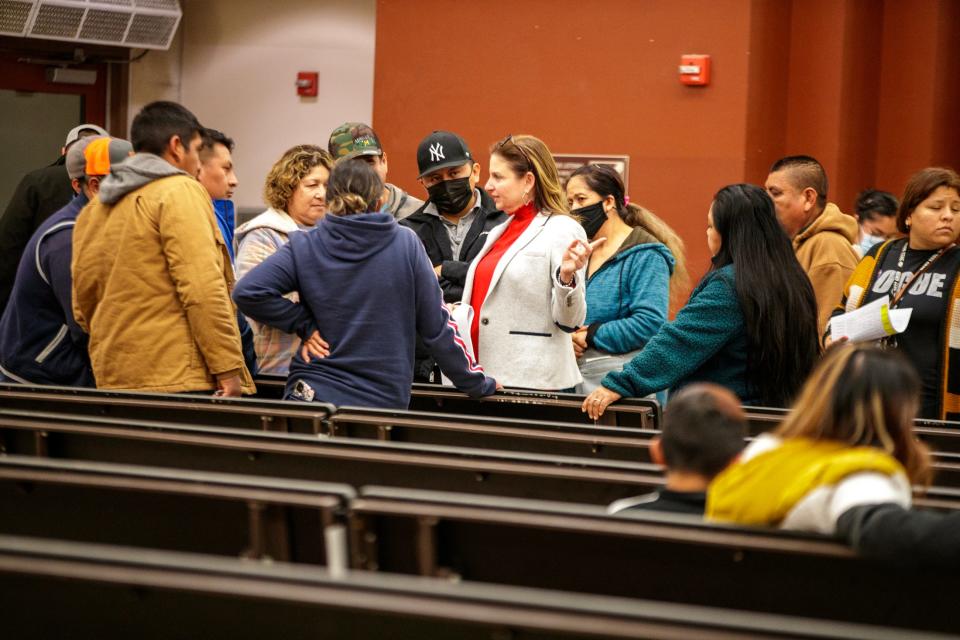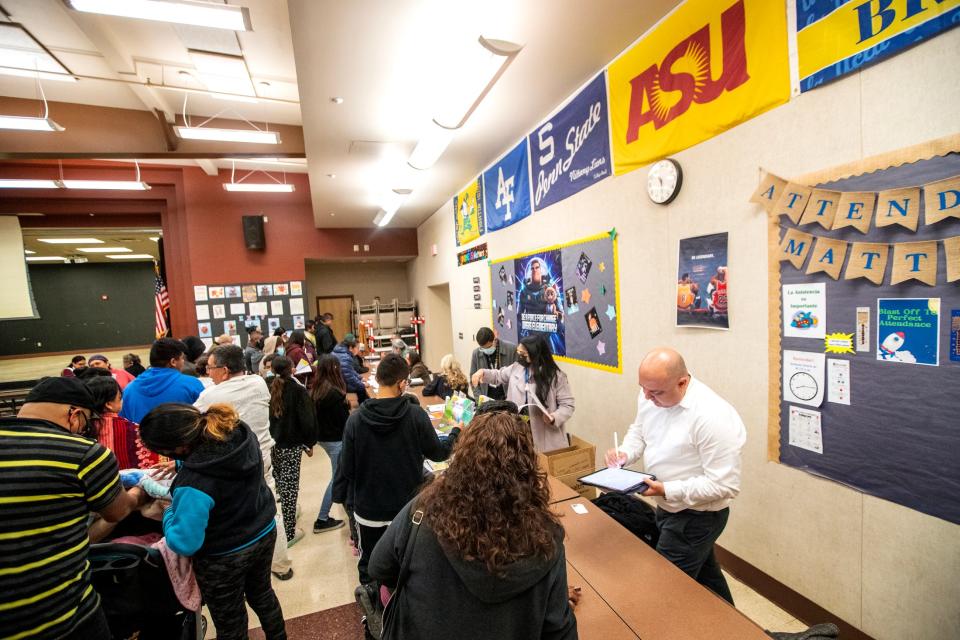How the county is working to help residents move from troubled Oasis Mobile Home Park

After a presentation from Riverside County housing officials at a community meeting with Oasis Mobile Home Park residents in February, dozens of families dispersed throughout the Oasis Elementary School auditorium, to booths with information about how they could find a new place to live.
Representatives from environmental groups, the Riverside University Health System’s public health department and real estate agents were all available, but a longer line formed for a chance to speak to the county’s housing department about the Oasis Housing Opportunity Program.
The new program, abbreviated as OHOP, is part of ongoing county efforts to help families relocate from the park in Thermal, given decades of health hazards and issues with contaminated water there.
OHOP will draw from $30 million in state funding approved for relocation from Oasis in 2021, but the amount individual families will get is still unclear, as well as how many families can participate.

Though many Oasis residents at the meeting said they'd heard they could get $100,000 to relocate, county housing authority Deputy Director Mike Walsh later told The Desert Sun that the department has not established a dollar amount.
"There are 200 trailers remaining out there. All 200 households, if their move-out is at $100,000 a piece, that's $20 million. And so, theoretically, that could happen," Walsh said, with the caveat that the likelihood is low, "because that would assume that all these folks qualify for homeownership opportunities and everything else down the line."
It would also assume that all Oasis residents want the same "housing scenario," Walsh said. He talked about a family the county's been working with, who expressed interest in relocating their mobile unit from Oasis Mobile Home Park to a park in North Shore, rather than buying a house.
"That may not necessarily take the full $100,000, if they go through with it. That may only take $35,000," Walsh said.
At the community meeting, Maria Meza, a current park resident, expressed the same thought. "Some of us would be OK to relocate to another mobile home park," she said, but also questioned whether everyone will receive assistance or not.
"I heard we'd get $100,000 per family to relocate, but now I'm hearing all these conditions and questions to see if we qualify," Meza said. "I'm concerned years will pass by, not everybody will relocate and the money will disappear."
Since the approval of the $30 million in state funding to help Oasis families move, the county has authorized use of the funds on two occasions: $7 million to advance development of an affordable housing complex in the town of Oasis in mid-2022, and in November, $279,000 to upgrade the Maria y Jose Mobile Home Park, in the same area.
Although the goal was to help 12 families relocate to the Maria y Jose park by the start of 2023, a spokesperson from Supervisor V. Manuel Perez's office said full buildout is now expected by August. Families who move there will be chosen beginning in June from a county wait list.
The Thermal area, along with the rest of the Coachella Valley, is part of Perez's district.

To qualify for OHOP, the main requirement is to have been a resident at Oasis before October 2021. Walsh noted that residents would still have to be approved by lenders or other agencies to move forward with homeownership.
Some residents who secure loans for new homes could get them paid off using OHOP money if they meet criteria, such as staying in the home a certain amount of time, Walsh said. He added that would mean treating the loan as "a forgivable grant."
The application for OHOP asks residents about their family size, income levels, work information and what type of housing they're seeking.
The county is "trying to fit a number of different needs within this program," Walsh said.
People who want to apply for OHOP or get more information can contact county housing department development specialist Elba Castellanos at 760-863-7450 or ELCastellanos@rivco.org.
Many of Oasis' residents are farmworkers, who hope to stay near work in the east valley. But the lack of proper infrastructure in the area, including for water safety, has made it difficult to build new homes for them to relocate to, according to county and state officials.
At the February meeting, residents also learned about a memorandum of understanding between the county and the Torres-Martinez Desert Cahuilla Indians, which owns the land on which Oasis Mobile Home Park sits, that will enable county authorities to enact new enforcement to prevent new tenants from moving into the park.
Measures will include the "installation of physical k-rails; removal of trailers; demolishment of uninhabitable trailers; and removal, abandonment or disconnection of unauthorized or unlawful utilities, including unpermitted water connections, septic connections (and) electrical connections," according to the agreement.
"I think it's good. We'd been asking for that for a long time," said Araceli Gomez, a resident at Oasis. She said it gave her hope that people will really get to move out and the park will close for good — a shared goal between the county, the tribe and the U.S. Bureau of Indian Affairs that Perez had announced in August.
Eliana Perez covers the eastern Coachella Valley. Reach her at eliana.perez@thedesertsun or on Twitter @ElianaPress.
This article originally appeared on Palm Springs Desert Sun: Riverside County looks to help residents leave Oasis Mobile Home Park

